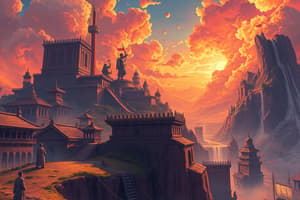Podcast
Questions and Answers
Jakie zdarzenia miały kluczowe znaczenie dla myśli politycznej i systemów podczas nowoczesnej historii?
Jakie zdarzenia miały kluczowe znaczenie dla myśli politycznej i systemów podczas nowoczesnej historii?
- Oświecenie (correct)
- Rewolucja przemysłowa
- Migracje ludności
- Wojny religijne
Jakie zjawisko miało istotny wpływ na zmiany strukturalne w społeczeństwie w okresie nowoczesnym?
Jakie zjawisko miało istotny wpływ na zmiany strukturalne w społeczeństwie w okresie nowoczesnym?
- Rewolucja przemysłowa (correct)
- Wynalezienie druku
- Odkrycia geograficzne
- Powstanie absolutyzmu
Który z poniższych okresów jest zazwyczaj uznawany za początek nowoczesnej historii?
Który z poniższych okresów jest zazwyczaj uznawany za początek nowoczesnej historii?
- Średniowiecze
- Wieki XV-XVI
- Wiek XX
- Wiek XVIII (correct)
Jakie podejście do historii koncentruje się na badaniu działań wojennych i strategii?
Jakie podejście do historii koncentruje się na badaniu działań wojennych i strategii?
Jakie metody są stosowane przez historyków w ocenie autentyczności źródeł?
Jakie metody są stosowane przez historyków w ocenie autentyczności źródeł?
Flashcards
Historia (łac.)
Historia (łac.)
Słowo łacińskie oznaczające historię, obejmujące badanie przeszłych wydarzeń.
Historia współczesna
Historia współczesna
Okres od końca XVIII lub początku XIX wieku do czasów współczesnych, obejmujący znaczące rewolucje, industrializację i konflikty globalne.
Źródła historyczne
Źródła historyczne
Materiały wykorzystywane przez historyków do zrozumienia przeszłości, w tym źródła pierwotne (np. listy, pamiętniki, dokumenty oficjalne) oraz źródła wtórne (np. książki, artykuły).
Krytyczne myślenie historyczne
Krytyczne myślenie historyczne
Signup and view all the flashcards
Metody historyczne
Metody historyczne
Signup and view all the flashcards
Study Notes
Historical Periods and Approaches
- Historia is the Latin word for history, encompassing the study of past events.
- Modern history often refers to the period from the late 1700s or early 1800s to the present day. This period encompasses significant revolutions, industrialization, and global conflicts.
- Different historical approaches exist, including:
- Political history: focuses on political events, leaders, and institutions.
- Social history: explores social structures, daily life, and cultural trends.
- Economic history: examines economic systems, trade, and development.
- Cultural history: investigates cultural values, art, and ideas.
- Military history: studies warfare, strategies, and their impact.
Key Features of Modern History
- The Enlightenment and subsequent revolutions (e.g., American, French) significantly impacted political thought and systems.
- Industrialization led to urbanization, technological advancements, and shifts in social structures.
- Globalization increased interconnectedness through trade, communication, and migration.
- World Wars and Cold War significantly shaped the 20th and early 21st centuries, leading to geopolitical realignments and conflicts.
- The rise of nationalism played a major role in shaping national identities and conflicts.
- Contemporary issues like climate change, pandemics, and technological advancement continue to reshape the present and future.
Historical Sources and Methods
- Historians utilize a range of sources to understand the past, including:
- Primary sources: firsthand accounts (e.g., letters, diaries, official documents).
- Secondary sources: analyses and interpretations based on primary sources (e.g., books, articles).
- Historians employ various methodologies, including:
- Source criticism: evaluating the authenticity and reliability of sources.
- Contextualization: understanding events within their historical and social contexts.
- Interpretation: developing arguments and perspectives about the past.
- Historical research often involves close examination of evidence, debates, and differing perspectives.
Historical Thinking and Skills
- Critical thinking is essential for critically evaluating historical sources and arguments.
- The ability to analyze and interpret evidence is crucial to understanding the past.
- Constructing coherent narratives of the past requires understanding cause and effect relationships.
- Recognizing bias and perspective in historical accounts is integral to historical analysis.
- Understanding historical context is fundamental to comprehending past events and their significance.
- Developing historical empathy is important to recognizing diverse perspectives and experiences in the past.
Specific Themes and Examples in Modern History
- The rise of democracy and its spread across the world.
- The evolution of political ideologies (liberalism, socialism, fascism).
- Imperialism and its consequences, including decolonization movements.
- The development of world economies and trade relationships.
- The changing role and status of women and other marginalized groups.
- Technological advancements and their impact on society.
- Major global conflicts and their consequences.
- The emergence of new technologies, like the internet, and their impact on communication and culture.
Studying That Suits You
Use AI to generate personalized quizzes and flashcards to suit your learning preferences.




